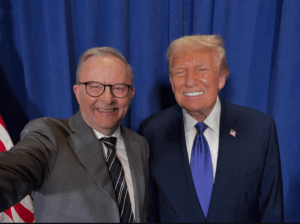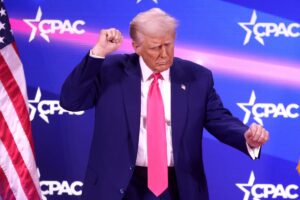The Assange litmus test and the fight to shape a future Trump administration

Who would have thought that the legal and personal travails of Julian Assange, the Australian citizen whom US authorities are invested in prosecuting and jailing for the rest of his life without deep consideration of his fundamental rights, would become a lightning rod for former President Trump’s re-election hopes?
An hour or so before Trump was due to take the stage at the Libertarian National Convention last Saturday evening, National Chair Angela McArdle appeared at the lectern. McArdle drily observed that the crowd, full of MAGA cap-wearing Trump supporters, was occupying seats clearly reserved for Libertarian Party delegates. McArdle asked them to move, even going so far as to warn them not to make her come down there and “start a chair fight”.
The atmosphere was tense, and felt close to cracking, but McArdle deftly held things together. The Trump supporters moved for the Libertarians, eventually.
Trump was, as McArdle pointed out, there to speak to them, not the adoring fans who had tried to pack out the event. The former president had accepted the invitation in an effort to convince libertarians to vote for him in November – the first time a former president has ever graced them with his presence.
But the libertarians are a skeptical bunch; it was never going to be an easy task.
McArdle was followed by favorite Libertarian comedian David Smith, who reminded the restless audience that “we are not a bunch of college leftist sissies. We believe in free speech, so be respectful…the message that we are sending to the world is not that we can’t handle ideas we disagree with.”
As both Smith and McArdle pointed out Libertarians do, on the surface at least, share several causes in common with Trump. There is Trump’s vitriol about a weaponised Department of Justice, a railing against the “Deep State”, a commitment to lower or even abolish taxes, and a big focus on dismantling “woke” policies and institutions.

But while Trump has reshaped the Republican Party in his image, it remains a bastion of radical far-right conservatism, not libertarianism – an ideology represented by a very different (and much smaller) movement and party. Before the former president spoke, that party had held a vote on the issues they most wanted him to cover, ranking the things that might convince them to vote for him.
Trump isn’t used to those kinds of demands. And he is not used to the kind of crowd he spoke to on Saturday night.
He took the stage half an hour late, after the audience had already waited hours – but that is a lot less time than Trump usually demands of his supporters. That was, perhaps, a tacit acknowledgement that this wasn’t a normal rally full of adoring fans, as Vivek Ramaswamy discovered the day before. Trump crossed the stage to boos and cheers, a pattern that didn’t stop for his 40-minute speech (again, much shorter than usual).
As Trump read his stock lines from the autocue, the crowd got louder. Chants of “we want Trump!” were countered by “End the Fed!” (a favourite Libertarian cause) and repeated, loud booing. The crowd heckled Trump at every turn, accusing him of lying about dismantling the “Deep State”, claiming that it was his administration’s spending that caused today’s inflation, and expressing fury at his administration’s Covid lockdowns and vaccine policies.
Aside from “End the Fed!”, though, the loudest chants were to “Free Ross!” The cause of Ross Ulbricht, who is currently serving two life sentences in federal prison for running the “Silk Road” website, is a critical political question for the Party.
In the list of issues participants were invited to vote on, Ulbricht’s freedom came in first. Australian citizen Julian Assange’s was second.
Trump did not concede much in his quest to gain their support. He made a vague promise to put a Libertarian in his cabinet, another about “he said, she said” sexual assault laws, and heckled them about being losers. None of that endeared him to the room.
But Trump did commit to pardoning Ulbricht. That elicited cheers of genuine joy and relief from the crowd, many of whom were waving signs and jumping up and down.
But the atmosphere remained heavy as it became clear that Trump was not going to mention the second person on the list. Calls of “What about Assange?” could be heard across the room.
Assange’s case had helped frame the Convention. His brother Gabriel Shipton was a keynote speaker. Both Vivek Ramaswamy and presidential hopeful Robert F. Kennedy Jr called for his freedom.
Their calls, and those of the audience, went unanswered.
In a typically strange twist, when asked directly whether he would pardon Assange on a podcast released on Monday US time, but recorded before the speech, Trump said “well I’m gonna talk about that today and we’re going to give it very serious consideration…”
The fact that he didn’t then mention Assange in the speech led some to suggest that the former president had perhaps confused Ulbricht and Assange; though he may also have been equivocating, as he often does.
It is not entirely a surprise that Trump didn’t mention Assange or commit to a pardon. It was under his administration, largely at the behest of then CIA Director Mike Pompeo, that Assange was charged under the 1917 Espionage Act – a move unprecedented in the Act’s history and a clear threat to press freedom across the globe. There is credible evidence that under Pompeo’s leadership, plans were made to kidnap and assassinate Assange, an Australian citizen.

Trump’s commitment to “consider” Assange’s case puts him on par with the current president, who has also said his administration is “considering” dropping the Trump-era charges. Speaking at the Convention the day before Trump, outlier Robert F. Kennedy went further, committing to pardoning Assange.
More broadly, Trump’s refusal to make a similar commitment, despite the fact that it would have been an easy political win with the libertarians, raises even more doubts over what a (hypothetical) second Trump administration might look like.
The broad, ideologically incoherent support that Trump attracts underpins a noxious contest for power and influence in both the campaign and among those who might make up a future administration. This contest is playing out in efforts like the Heritage Foundation’s Project 2025, and in the race to be Trump’s second in command.
While VP hopefuls like Vivek Ramaswamy are pitching to the libertarian end of the political spectrum, other candidates, like Ohio Senator JD Vance, are pitching to the conservative far-right.
In this ideological battle, Assange’s case has emerged as a litmus test. While Ramaswamy has called for his freedom, more conservative contenders like Vance, Mike Pompeo, and Marco Rubio have done the opposite.
Who Trump ultimately picks will give the clearest indication yet of who is winning the fight for ideological supremacy in the Trump movement, and thus what a second administration might do.
Viewed from Australia, it will also indicate how much attention a future Trump administration might be willing to pay Australian concerns, AUKUS agonies aside.
Trump’s refusal to commit to freeing Assange, despite repeated calls from the Australian people, parliament and prime minister, suggest that a second Trump administration might be much more difficult for Australia (and the rest of the world) to manage than the first.
Between the Lines Newsletter
The biggest stories and the best analysis from the team at the Australia Institute, delivered to your inbox every fortnight.
You might also like
Trump has long speculated about using force against his own people. Now he has the pretext to do so
“You just [expletive] shot the reporter!” Australian journalist Lauren Tomasi was in the middle of a live cross, covering the protests against the Trump administration’s mass deportation policy in Los Angeles, California. As Tomasi spoke to the camera, microphone in hand, an LAPD officer in the background appeared to target her directly, hitting her in
Can Albanese claim ‘success’ with Trump? Beyond the banter, the vague commitments should be viewed with scepticism
By all the usual diplomatic measures, Australian Prime Minister Anthony Albanese’s meeting with US President Donald Trump was a great success. “Success” in a meeting with Trump is to avoid the ritual humiliation the president sometimes likes to inflict on his interlocutors. In that sense, Albanese and his team pulled off an impressive diplomatic feat. While there was one awkward
Donald Trump cannot make the Epstein files go away. Will this be the story that brings him down?
Conspiracy theories are funny things. The most enduring ones usually take hold for two reasons: first, because there’s some grain of truth to them, and second, because they speak to foundational historical divisions. The theories morph and change, distorting the grain of truth at their centre beyond reality. In the process, they reinforce and deepen



